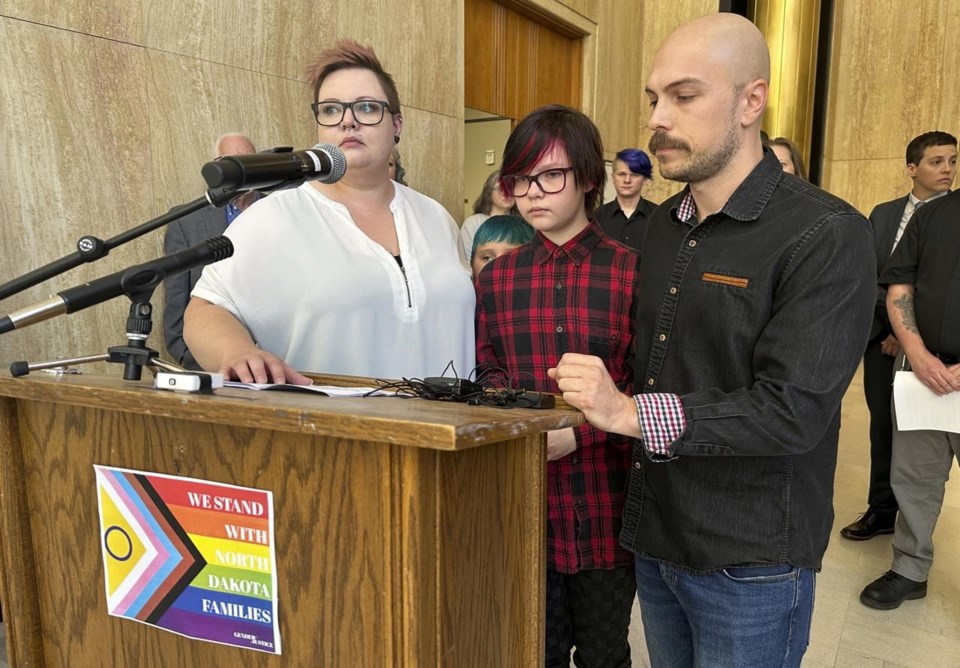BISMARCK, N.D. (AP) — Families and a pediatrician are challenging North Dakota's law criminalizing gender-affirming care for minors, the latest lawsuit in many states with similar bans.
Gender Justice on Thursday announced the state district court lawsuit in a news conference at the state Capitol in Bismarck. The lawsuit against the state attorney general and state's attorneys of three counties seeks to immediately block the ban, which took effect in April, and to have a judge find it unconstitutional and stop the state from enforcing it.
State lawmakers “have outlawed essential health care for these kids simply and exclusively because they are transgender,” Gender Justice attorney and North Dakota state director Christina Sambor told reporters. “They have stripped parents of their right to decide for themselves what's best for their own children. They have made it a criminal offense for doctors to provide health care that can literally save children's lives.”
The bill that enacted the ban passed overwhelmingly earlier this year in North Dakota's Republican-controlled Legislature. Republican Gov. Doug Burgum, who is running for president, signed the ban into law in April. It took effect immediately.
“Going forward, thoughtful debate around these complex medical policies should demonstrate compassion and understanding for all North Dakota youth and their families,” Burgum said at the time.
Tate Dolney, a plaintiff and 12-year-old transgender boy from Fargo, said gender-affirming care helped his confidence, happiness, school work and relationships with others.
“I was finally able to just be who I truly am,” the seventh-grader told reporters. “It has hurt me all over again to know that the lawmakers who have banned the health care don't want this for me and want to take it all away from me and every other transgender and nonbinary kid who just wants to be left alone to live our lives in peace.”
Mother Devon Dolney said Tate was previously severely depressed and angry, but with the care “went from being ashamed and uncomfortable with who he is to being confident and outspoken," a “miraculous” change.
North Dakota's ban has led the family to travel farther for Tate's appointments, now in neighboring Minnesota, she said. The family has considered moving out of North Dakota, she said.
Politicians “have intruded on our lives and inserted themselves into decisions that they have no business being involved in,” father Robert Dolney said.
The law exempts minors who were already receiving gender-affirming care, and allows for treatment of “a minor born with a medically verifiable genetic disorder of sex development.”
But the grandfather clause has led providers “to not even risk it, because that vague law doesn't give them enough detail of exactly what they can and cannot do" — an element of the suit, Gender Justice Senior Staff Attorney Brittany Stewart said.
North Dakota Attorney General Drew Wrigley told The Associated Press he hadn't seen the lawsuit's filing, but his office “will evaluate it and take the appropriate course.”
Bill sponsor and Republican state Rep. Bill Tveit told the AP that he brought the legislation to protect children.
“I've talked to a number of people who are of age now and would transform back if they could, and they're just really upset with their parents and the adults in their life that led them to do this, to have these surgeries," Tveit said. He declined to identify the two people he said he talked to, but said one is a college student in Minnesota that he became acquainted with while working on the bill.
North Dakota's law criminalizes doctors' performance of sex reassignment surgeries on minors with a felony charge, punishable up to 10 years' imprisonment and a $20,000 fine.
The law also includes a misdemeanor charge for health care providers who prescribe or give hormone treatments or puberty blockers to minors. That charge is punishable up to nearly a year's incarceration and a $3,000 fine.
Opponents of the bill said sex reassignment surgeries are not performed on minors in North Dakota, and the ban on gender-affirming care would harm transgender youth, who are at increased risk for depression, suicide and self-harm.
At least 22 states have now enacted laws restricting or banning gender-affirming medical care for transgender minors, and most of those states face lawsuits. A federal judge struck down Arkansas’ ban as unconstitutional, and a federal judge has temporarily blocked a ban in Indiana.
___
This story has been corrected to show that Robert Dolney said politicians have “inserted themselves into decisions ...,” not politicians have “inserted themselves into positions ...”
Jack Dura, The Associated Press




